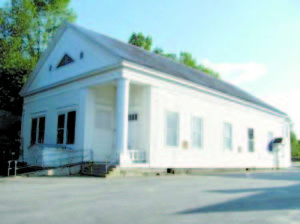Town Hall named one of Maine’s most endangered historic places

Bridgton Town Hall was built in 1852 as the town’s largest single meeting space. During a 1902 expansion, the Doric column on the outside corner of the entrance porch was installed upside down, and the mistake was never corrected.
By Gail Geraghty
Staff Writer
The Bridgton Town Hall on North High Street has been selected by Maine Preservation as one of 10 of Maine’s Most Endangered Historic Places of 2015. The Executive Committee of the Board of Trustees approved the listing at its last meeting, and the announcement was made Tuesday on WCSH-TV’s 207 news program.
“As a property of great historic significance and an excellent example of how a historic building can be adapted to new uses to meet the changing needs of a community, we hope and intend that this listing will be an aid to the building’s preservation, as it has to buildings previously listed,†said Greg Paxton, Maine Preservation Executive Director.
The other nine listings named by Maine Preservation are the Vaughan Woods stone bridges in Hallowell, Stimson Memorial Hall in Gray, Old Surry Schoolhouse in Surry, Oak Grove Chapel in Vassalboro, Weston Homestead in Madison, Crooker House in Norway, Jonathan Eddy House in Bangor, Keen Hall in Freedom, and the J. M. Rice Block in Houlton.
In a letter to Town Manager Bob Peabody, Paxton said Maine Preservation is available to help the town in its efforts to preserve the local landmark. Town Hall once served as the gymnasium and phys ed space for the former Bridgton High School, and still serves as the town’s official polling and Town Meeting place. In addition, it serves as the town’s primary center for recreation programming.
The century-old building is currently undergoing a $350,000 stabilization project for which funding was approved at the 2014 Town Meeting. Only the first phase of the repairs recommended in an engineering study are part of the project, however, and the naming of Town Hall to Maine’s Most Endangered Historic Places list will improve chances that the town could secure additional funding through historic preservation grants and tax credits.
Funding still needs to be secured for a roof replacement and interior improvements, as well as grading work in the rear of the building to direct groundwater away from the foundation.
According to Maine Preservation’s website, the Most Endangered Historic Places List began in 1996 for the purpose of identifying and raising public awareness “of the breadth and interest in preserving endangered and threatened historic properties and materials.†Of Bridgton Town Hall, Maine Preservation, a statewide member-driven nonprofit organization, has this to say in describing why the building was selected:
The Story
“Originally known as the Town House, Bridgton Town Hall was built in 1852 as a replacement for the 1791 Bridgton Meeting House. Built as the largest single meeting space for the town of Bridgton, the Town Hall’s central meeting room was finished with a plaster arched ceiling, flanking platforms for seating and a large central cast iron stove for heat. During a 1902 expansion, rooms were added at the back and the fixed seating was removed from the meeting room. The current asymmetrical façade was also constructed in this year: the front door was moved to the right and the front right corner of the structure was cut away to create an entry porch with a large classically-styled column placed at the outside corner. The rooms to the left of the porch became the new town offices, which were converted to men’s and women’s locker rooms. Much to Bridgton’s surprise, the builder installed the Doric column upside down, and the mistake has never been corrected. Throughout its history, the Town Hall has been used for annual Town Meetings, socials, concerts, and other community functions. The Town Hall is now used as a recreation center, hosting activities like basketball, Tai Chi, and ping pong on a daily basis, in addition to being a municipal and community center.â€
The Threat
“Despite serving as an excellent example of how an historic building can be adapted to new uses to meet the changing needs of a community, some members of the Bridgton community placed two referendum questions on the ballot to stop the town from continuing to invest in the building, both of which were defeated by the voters. This group argues that tearing down the historic building in order to make way for new development would increase the tax base. Town Selectmen accepted a bid in June 2015 to complete necessary repairs to the sills, foundations and to upgrade mechanical systems. Community members, recognizing the value of this historic building, have won the latest fight, but the issue remains contentious, and with additional funding likely to be needed over the coming years, the fate of the building is not yet secured. While the debate seems to be framed as either the town restores the building or tears it down, there are also many examples of historic structures that have been successfully adapted by private parties to become cultural and economic drivers for downtowns.â€
The Solution
“In response to the voters, the Selectmen should continue to invest in the building while also actively seeking new community users for the space, which increases the social and economic vibrancy in town. A future option could also be to sell the building to a new owner interested in adaptive use — a far better option than demolition, which should be taken off the table. Residents or property owners in Bridgton can contact the town at townclerk@bridgetonmaine.org to express support for the property. Anyone with ideas for new uses for the building can e-mail Maine Preservation at info@mainepreservation.org.â€

